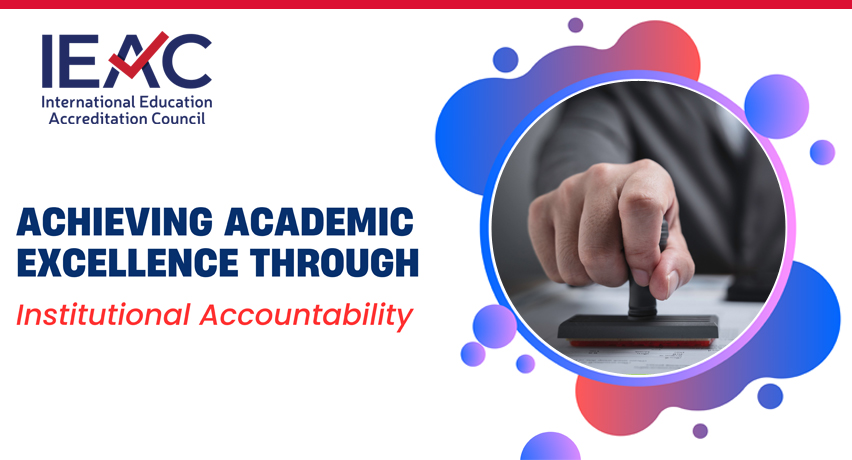- Home
- About IEAC
- Accreditation
- University Accreditation
- College Accreditation
- Online Institution Accreditation
- School Accreditation
- University Recruitment Agency Accreditation
- Programmatic Accreditation
- Teacher/ Lecturer Accreditation
- Religious Institutes Accreditation
- Affiliate Accreditation
- Research Accreditation Candidacy Accreditation
- IEAC Membership
- Institutions Accredited
- Accreditation Process
- Contact Us Webinar Apply Now
Blog
Achieving Academic Excellence Through Institutional Accountability
Lorem ipsum dolor sit amet, consectetur adipiscing elit, sed do eiusmod tempor incididunt ut labore et dolore magna aliqua. Quis ipsum suspendisse ultrices gravida. Risus commodo viverra maecenas accumsan lacus vel facilisis.

Achieving Academic Excellence Through Institutional Accountability
In today's rapidly evolving educational landscape, accreditation plays a pivotal role in ensuring the quality, transparency, and accountability of institutions. Accreditation has emerged as the hallmark of reliability in higher education as businesses search for skilled graduates and students seek for reputable educational providers.
However, what is accreditation exactly, and why is institutional responsibility important for students and society at large? The importance of these two interrelated components in the field of education is examined in this blog.
Understanding the Accreditation
Accreditation is a formal, independent review process that evaluates the quality and effectiveness of educational institutions or specific programs. It is carried out by recognized accrediting bodies, which assess an institution’s adherence to set academic standards, operational policies, and outcomes. The accreditation process acts as a seal of approval for schools and universities, indicating that the establishment either fulfils or surpasses set standards for the quality of education it provides.
The process typically involves a detailed examination of factors such as:
- Curriculum quality
- Faculty qualifications
- Institutional resources
- Student support services
- Learning outcomes
Why is Accreditation Vital?
Accreditation provides several benefits for institutions, students, and society:
Assurance of Quality: Accreditation ensures that institutes maintain high standards in teaching, curriculum design, and student services. This assurance helps students and parents make well-versed choices about their education.
Access to Financial Aid: Accredited institutions are eligible to offer financial aid to their students. Governments and private entities typically offer scholarships, loans, and grants only to students enrolled in accredited institutions.
Credit Transfers: Accreditation also eases the transfer of credits between institutions. Students transferring to a different college or pursuing advanced degrees will find that credits earned at accredited organizations are more likely to be recognized.
Employment Opportunities: Employers often prefer to hire graduates from accredited institutions, as they trust that these candidates have received an education that meets industry standards.
Institutional Accountability: Why It Matters
While institutional responsibility makes sure that these requirements are consistently fulfilled and exceeded, accreditation establishes the bar for quality. The continuous obligation that educational institutions have to their constituents—students, teachers, employers, and society at large—is referred to as accountability. Building confidence among its stakeholders, an accountable organisation is open and honest about its objectives, resource allocation, and performance results.
Here are the main ways institutional accountability benefits the educational ecosystem:
Transparency in Operations: Accountability ensures that institutions are transparent in their governance, finances, and academic results. This transparency builds confidence in the institution’s integrity and operations.
Continuous Improvement: Institutions that are held accountable regularly evaluate and improve their programs and services. This continuous improvement ensures that the institution remains competitive and relevant in an ever-changing academic landscape.
Student Success: An accountable institution focuses on the success of its students, from admissions through to graduation and career placement. Metrics like graduation rates, job placement statistics, and student satisfaction are important indicators of an institution's accountability.
Public Trust: Eventually, an accountable institution contributes to societal good. Institutions that produce well-educated, capable graduates enhance the workforce and build a more educated, informed society.
The Association Between Accreditation and Accountability
Accreditation and institutional accountability go hand in hand. Accreditation delivers a framework for institutions to meet quality standards, while accountability safeguards they maintain and evolve those standards over time. Accredited institutions are regularly reviewed and must demonstrate that they continue to meet criteria that justify their accredited status. This cyclical process fosters a culture of quality and accountability within the institution.
How IEAC Accreditation Helps in Quality Education
- IEAC (International Education Accreditation Council) accreditation safeguards that educational institutions meet rigorous standards of quality and performance.
- Accreditation processes encourage institutions to engage in regular self-assessment and development.
- Accreditation by IEAC improves the credibility of institutions, making their programs more attractive to potential students.
- IEAC accreditation facilitates global recognition of educational programs.
- Accreditation processes encourage institutions to adopt innovative teaching and learning methods.
In short, IEAC accreditation plays a vital role in ensuring quality education by establishing standards, promoting continuous improvement, enhancing credibility, and focusing on student results.
To End With
Accreditation and institutional accountability are foundational to maintaining the integrity and quality of higher education. They provide the assurance students need when selecting an institution and the confidence employers seek in graduates. Together, they create an educational environment that is transparent, focused on continuous improvement, and committed to student success. As the global demand for higher education grows, institutions that prioritize both accreditation and accountability will continue to thrive, producing graduates ready to meet the challenges of the modern workforce.





.jpg)
